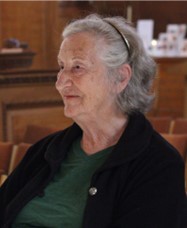Thea Musgrave facts for kids
Thea Musgrave (born on May 27, 1928) is a famous Scottish composer who writes operas and classical music. She has lived in the United States since 1972.
Contents
About Thea Musgrave
Thea Musgrave was born in Barnton, a part of Edinburgh, Scotland. She went to a boarding school called Moreton Hall School and then studied at the University of Edinburgh. After that, she went to Paris to learn from a very important music teacher named Nadia Boulanger from 1950 to 1954. In 1958, she also studied with another famous composer, Aaron Copland, at the Tanglewood Festival.
In 1970, Thea Musgrave became a guest professor at the University of California, Santa Barbara. This helped her become more involved in the music scene in the United States. She married an American musician named Peter Mark in 1971. He was a violist and an opera conductor. Later, from 1987 to 2002, she was a special professor at Queens College, City University of New York.
Her Music Style
Thea Musgrave's music often explores "dramatic-abstract" ideas. This means her music tells a story or shows feelings without using words. For example, her Concerto for Orchestra (1967) and Concerto for Horn (1971) show this style.
Sometimes, her music is more "programmatic," meaning it's inspired by a specific story or idea. For instance, her oboe concerto Helios (1994) is about the Sun God, and the oboe soloist represents him. She also gets ideas from art. The Seasons was inspired by paintings she saw at the Metropolitan Museum of Art in New York. Another piece, Turbulent Landscapes (2003), paints a picture of famous paintings by J. M. W. Turner using music.
Her Operas and Music Plays
Thea Musgrave has written more than a dozen operas and other musical plays. Many of these works are about important historical figures. Some of her famous operas include:
- Mary, Queen of Scots (1977), about the Scottish queen.
- Harriet, the Woman called Moses (1984), about Harriet Tubman, who helped many enslaved people find freedom.
- Simón Bolívar (1993), about the South American leader.
- Pontalba (2003).
In 2008, when she turned 80, many new pieces of her music were performed, including Points of View and Green. Her music continues to be celebrated. In 2018, for her 90th birthday, her compositions were played at the Edinburgh International Festival and the BBC Proms. Her opera Mary Queen of Scots was performed by the English National Opera in London on February 15, 2025.
Thoughts on Being a Composer
When asked by the BBC about being a "woman composer," Thea Musgrave once said, "Yes I am a woman, and I am a composer. But rarely at the same time." This means she sees herself as a composer first, not just a woman who composes. She also shared advice for young composers: "Don't do it, unless you have to. And if you do, enjoy every minute of it." She means that being a composer can be tough, but if you truly love it, it's worth it.
Awards and Special Recognitions
Thea Musgrave has received many awards and honors for her amazing contributions to music:
- She won the Koussevitzky Award in 1974.
- She received two Guggenheim Fellowships, which are special awards for artists and scholars, in 1974-75 and 1982-83.
- She has honorary degrees from several universities, including Glasgow University and the Royal Conservatoire of Scotland.
- In 2002, she was made a Commander of the Order of the British Empire (CBE) by the Queen. This is a very high honor in the United Kingdom.
- She was awarded the Queen's Medal for Music in 2017.
Her Musical Works
Thea Musgrave has created a large number of musical pieces across different styles.
Orchestral Music
These are pieces written for a full orchestra.
- Concerto for Orchestra (1967)
- Clarinet Concerto (1969)
- Concerto for Horn (1971)
- Viola Concerto (1973)
- The Seasons (1988)
- Helios (1994; for oboe and orchestra)
- Aurora (1999; for string orchestra)
- Turbulent Landscapes (2003)
- Wood, Metal and Skin (2004; for percussion and orchestra)
- Loch Ness – A postcard from Scotland (2012)
- Trumpet Concerto (2019)
Choral Music
These are pieces written for choirs, sometimes with instruments.
- The Five Ages of Man (1963; for chorus and orchestra)
- Rorate Coeli (1973)
- The Last Twilight (1980; for choir and brass instruments)
- Going North (2004; for children's choir)
- Ithaca (2010)
Chamber Music
These are pieces written for a small group of instruments, usually one player per part.
- Trio for flute, oboe and piano (1960)
- Orfeo (1975; for solo flute)
- Pierrot (1985; for clarinet)
- Cantilena (2008; for oboe quartet)
- Sunrise (2010; for flute, viola and harp)
Operas
Operas are plays where the story is told mostly through singing, often with an orchestra.
- The Abbot of Drimock (1955)
- Marko the Miser (1962)
- The Voice of Ariadne (1973)
- Mary, Queen of Scots (1977)
- A Christmas Carol (1979)
- Harriet, the Woman Called Moses (1985)
- Simón Bolívar (1995)
- Pontalba (2003)
See also
 In Spanish: Thea Musgrave para niños
In Spanish: Thea Musgrave para niños
 | Charles R. Drew |
 | Benjamin Banneker |
 | Jane C. Wright |
 | Roger Arliner Young |


